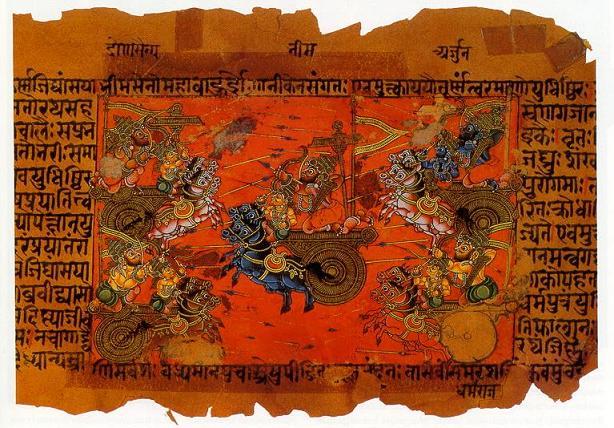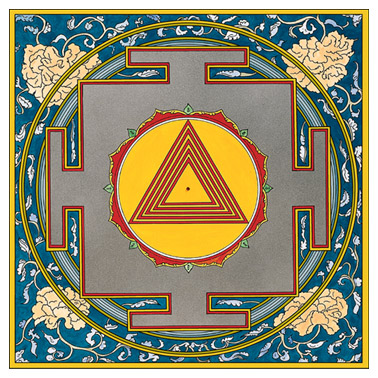A brief overview of the Mahabharata
Yudhisthira says: Forgiveness is the gateway to heaven
History of the Mahabharata
The Epic Mahabharata belongs to the group of scriptures called Smriti - the remembered word of God (see literature). Shruti (Vedas and Upanishads) is the group of scriptures that represent the cosmic sound of God that people once heard.
To specify a certain date of the Mahabharata events, historians compare various texts with true historical incidents. Thus, they can calculate dates such as when, for example, Krishna died. Albeit doubts can be cast on various conclusions of such approaches, for Hindus the Krishna's death starts the new era - Kali Yuga. The majority of scholars, historians and Hindu sages agree on the year 3102 BC (January 23). The Mahabharata ends with Krishna's death and there is a general consensus on the above date.
The earliest known historical records about this valuable book made Panini, an Indian Sanskrit grammarian from the 4th century BC. Western scholars often deform Indian history and screw it up to 2000 years BC only. A typical example is a statement from Encyclopedia Britannica (2005 Deluxe Edition) where it is said: "The traditional date for the war that is the central event of the Mahabharata is 1302 BC, but most historians prefer a later date". However, no source is given and no reference to how Hindus perceive the concept of "Brahma ages" (Dvapara Yuga, Kali Yuga, etc.) is presented. As we can see above, the distortion is too undisguised. Not a "preference", of course, but only an in-depth study supported with (cited) arguments can claim that a particular date is correct or not. The Mahabharata also unveils some important historical events that archeologists can document in a number of excavations the age of which goes back to the time before 4th century BC. These excavations have illustrations of the Mahabharata events on them.
As a written document, the Mahabharata had developed gradually and it was supplemented later. If we accept the general opinion of Hindus (date of Krishna's death), its story must have happened before the year 3102 BC.
On the Indonesian island Java there is a version of the Mahabharata
that developed territorially independently from the Indian subcontinent
- Kakawin Bharatayuddha is an
ancient poetical rendering of the Mahabharata.
Krishna and Arjuna are not only cousins
Vasudeva (Krishna's father) and Kunti (mother of the Pandavas) were brother and sister. Arjuna later married Krishna's sister Subharda, so he was also Krishna's brother-in-law.
The story
The authorship of the epic is traditionally ascribed to Vyasa, who is also one of the most important characters of the book. The first section of the Mahabharata introduces a few things and characters such as Ganesha - who, at the Vyasa's request - writes down the epic uninterruptedly in one time interval while Vyasa keeps dictating it.
 Although
there are several other things written in the beginning of the book,
the main plot starts evolving around the story of King
Shantanu (King of Hastinapura). Shantanu met Ganga,
was enthralled by her beauty, they started living together and she
gave him children. But Ganga, in order to protect her children's
souls from the curse once Vashishta
had imposed upon them (their children were actually eight Vasus
being cursed by Vashishta), decided to kill them. Upon agreeing
with Shantanu to become his partner she lays down a condition that
he would never ask her anything.
Although
there are several other things written in the beginning of the book,
the main plot starts evolving around the story of King
Shantanu (King of Hastinapura). Shantanu met Ganga,
was enthralled by her beauty, they started living together and she
gave him children. But Ganga, in order to protect her children's
souls from the curse once Vashishta
had imposed upon them (their children were actually eight Vasus
being cursed by Vashishta), decided to kill them. Upon agreeing
with Shantanu to become his partner she lays down a condition that
he would never ask her anything.
When after birth of their eighth child Ganga goes to the river to throw her little innocent boy into it, Shantanu is so depressed that he bursts out in anger and asks Ganga why she keeps killing all their children. However, upon breaking his promise not to ask any questions Ganga decides to leave, but the King receives a promise that his last son will come back one day.
Ganga keeps her promise and after some time she comes back and returns her eighth son - Devavrata. When Devavrata grows into a handsome prince, Shantanu meets Satyavati and falls in love with her. But their marriage is almost impossible, as Satyavati's father asks the King that it must be his daughter's children - not anyone else in the world - who would once inherit the throne.
King Shantanu is unable to agree. Had he agreed, Devavrata would have lost his legitimate right to become the successor of the throne. But Devavrata decides to help the Fates' steerage by an Oath that will constrain him to eternal celibacy. As soon as he takes the Oath before the Satyavati's father, he becomes a new man with a new name - Bhishma.
Shantanu and Satyavati have two children - Chitrangada and Vichitravirya. But the children do not live a long life and Shantanu falls ill and dies too. Satyavati is confronted with kingless Hastinapura - there is no successor of the throne. Bhishma refuses it because of his oath. She therefore asks Vyasa - a saint and her firstborn son, to help her. Vichitravirya was married to Ambika and Ambalika. Satyavati asked Vyasa to procreate a successor for the throne. Vyasa, although reluctant, after some time agrees and goes to Ambika first (first Vichitravirya's wife), but she gets so scared by seeing his dirty ascetic body that she, while they make love, keeps her eyes closed in anguish. Later she gives birth to Dhritarashtra, who is unfortunately blind. Satyavati therefore asks Vyasa to help her again. Now it is the Ambalika's turn, the second Vichitravirya's wife, but she, after seeing Vyasa, gets so scared that she looses all color and becomes pale. She gives birth to Pandu who is also pale.
Pandu becomes King, but one day he makes a big mistake and shoots a sage Kindama while he (Kindama) makes love with his spouse in the woods, being transformed to animals. As a consequence of this, the mating deer couple was seriously hurt and they transformed themselves back to human form. The male part, Kindama, after being shot by the Pandu's deadly arrow, gets so angry that his inescapable curse mutilates all Pandu's future life - the verdict is: if Pandu ever sexually associates with a woman, he falls right away into the hands of death. After the curse Pandu renounces the material world and Dhritarashtra, his stepbrother, becomes King of Hastinapura.
Pandu had two wives - Madri and Kunti. One day he cannot defend himself against Madri's sexual appeal, which makes him so desirous that the Kindama's curse straightens out its awaiting hands of death.
The Pandavas
Kunti wants to fulfill her maternal expectations, but she has no man. She recollects the moment when her first son Karna was conceived from an arcane mantra one sage had given her once. Surya, the Sun God, appeared to her then. Thus, Kunti remembers her secret mantra and gives birth to three sons (other two come from Madri), which are referred to as the Pandavas.
Yudhisthira's father was Yama; Bhima's father was Vayu, Arjuna's father was Indra. Then it was Madri who gave birth to two other sons - the twins, whose fathers were Ashwins (divine twins). Madri's sons are Nakula and Sahadeva. These all are the five Pandavas.
The Kauravas
Pandu and Dhritarashtra are stepbrothers and their descendants - the Pandavas and Kauravas, later fight for the throne of Hastinapura. Dhritarashtra had a son - Duryodhana, who was very evil. Although the Mahabharata says that Dhritarashtra had one hundred sons, when the story unfolds in reference to the Kauravas, the epic pays most attention predominantly to Duryodhana, Karna, Gandhari (Dhritarashtra's wife), Shakuni (Gandhari's brother) and a few other persons on the Kaurava's part.
The Kauravas also have support
from important royal advisors and teachers such as Drona (a
superb teacher of martial arts), Kripa (a
chief priest of the kingdom), Ashwattama (Drona's
son), Bhishma, and Vidura (the
third son whom Vyasa had conceived with a maiden - he later became
the chief minister in the Dhritarashtra's kingdom).
Conflicts between the Pandavas and Kauravas
The generally accepted rule on the basis
of which a successor of the throne was appointed
had been historically based mostly on the hereditary principle (father
- first-born son). When Satyavati had decided that the
Hastinapura's crown would glow on the
Vyasa's offshoots, she had not expected that Dhritarashtra's
and Pandu's sons would be in conflict. Yudhisthira
was older than Duryodhana and
after Dhritarashtra's death the legitimate
successor of the throne would be Yudhisthira. For Duryodhana,
the King Dhritarashtra's first-born son, this was a big pain and
he therefore strived every effort to contrive all unthinkable intrigues
and plots with aim to kill the Pandavas.
Exile and War
By inviting the Pandavas to play a dice game,
Duryodhana misuses their kind-heartedness. The game turns
up to be a fiendish decoy where with assistance of the treacherous
and double-faced Shakuni the
Pandavas lose everything including
themselves. They have a wife - Draupadi,
and when the Kauravas ordered that she must come before them
and look upon her humiliated husbands, the Kauravas then hanker
after seeing her undressed. But a miracle happens and her dress
unwinds as if being made of endless cloth strips. Draupadi
then speaks loud to Dhritarashtra and asks - did
Yudhisthira put her at stake before, or after he became a slave?
An emotional and impressive Draupadi's self-defending long monologue
makes everybody still for a long time until suddenly, under the
pressure of Draupadi's honesty and well-argued
words, King Dhritarashtra makes
the result of the game void.
Duryodhana gets so angry that he invites the Pandavas to play a second game where exile is at stake - either the Pandavas or Kauravas spend 12 years in exile. The Pandavas lose again and go to exile.
After 12 years (with one more year of anonymity - 13 years
all together, which was the Duryodhana's condition), they come back
and the war between the two family clans is imminent. Duryodhana
refuses to accept their successful concealment during the
anonymity year; both family
clans communicate via messengers only. Krishna becomes one
of them, too, and with intention to stop the war he demands only
five villages for the Pandavas. Duryodhana
refuses this offer too.
Divine Weapons
In the Mahabharata, divine weapons are used and here is a brief overview of them:


